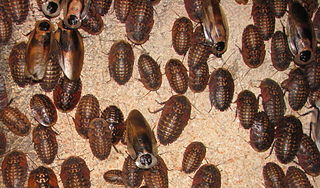
Giant cockroaches, or blaberids, are the second-largest cockroach family by number of species. Mostly distributed in warmer climates worldwide, this family is based on the American genus Blaberus, but much of the diversity is also found in Africa and Asia.

Parcoblatta virginica, the Virginia wood cockroach, is a small cockroach species of the genus Parcoblatta, measuring about a centimeter long as an adult.

Conocephalus is a genus of bush crickets, known as coneheads. It was described by Carl Peter Thunberg in 1815.
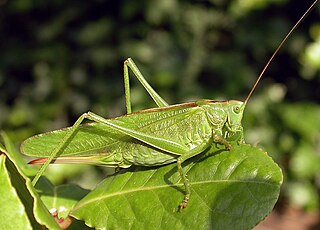
The Tettigoniinae are a subfamily of bush crickets or katydids, which contains hundreds of species in about twelve tribes.

Amantis is a genus of praying mantids native to Asia and the islands of the Pacific Ocean and now belongs to the monotypic tribe Amantini of the subfamily Iridopteryginae.

Blaptica dubia, the dubia roach, orange-spotted roach, Guyana spotted roach, or Argentinian wood roach, is a medium-sized species of cockroach which grows to around 40–45 mm (1.6–1.8 in).

Diploptera, occasionally called beetle cockroaches, is a genus of blaberid cockroaches in the monotypic subfamily Diplopterinae. Cockroaches of this genus resemble beetles, with hardened tegmina and cross-folded hindwings. They live in tropical forests in South China and Southeast Asia, and Pacific islands including Hawaii. They are viviparous cockroaches and are therefore used for insect endocrinological studies.

The Phaneropterinae, the sickle-bearing bush crickets or leaf katydids, are a subfamily of insects within the family Tettigoniidae. They are also known as false katydids or round-headed katydids.

Panchlora is a genus of cockroaches in the subfamily Panchlorinae, erected by Hermann Burmeister in 1838. Species are mostly found in the Americas and Africa. Most species in this genus are green in colour, but some are cream or grey.

Lucihormetica is a South American genus of giant cockroaches from the family Blaberidae, collectively referred to as glowspot cockroaches. It has been anecdotally reported that the thoracic spots of males are bioluminescent, but detailed research has been unable to conclusively prove this, although evidence for autofluorescence exists. The genus includes both relatively common and rare species: For example, L. verrucosa is relatively common and sometimes kept in captivity, while eight of the remaining species only are known from a single specimen each.

Parcoblatta divisa, the southern wood cockroach, is a species of cockroach native to the United States.

Orchelimum is a genus of katydid with 21 known species.
Arethaea is a genus of katydids in the family Tettigoniidae. There are at least 14 described species in Arethaea.
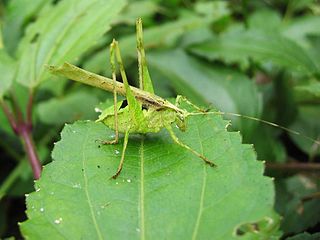
Insara, commonly known as western bush katydids, is a genus of katydids in the family Tettigoniidae.
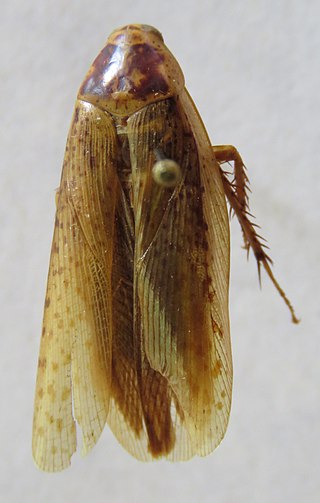
Epilampra is a genus of cockroach in the family Blaberidae. There are more than 70 described species in the genus Epilampra.

Ischnoptera is a genus of cockroach in the family Ectobiidae.
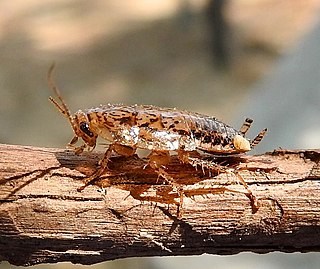
Latiblattella is a genus of cockroach in the family Ectobiidae.
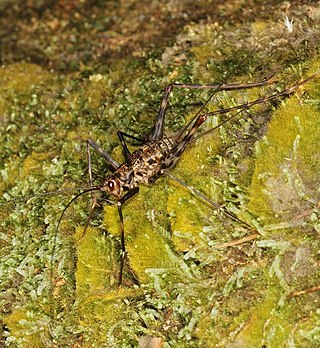
Phalangopsidae, which includes the "spider crickets" and their allies, is a reconstituted (2014) family of crickets, with the type genus Phalangopsis. Priority for family-group names based on this genus dates from Blanchard's "Phalangopsites".

Opisthoplatia is a genus of cockroaches in the family Blaberidae. There are at least two described species in Opisthoplatia, found in south and east Asia, and Indomalaya.

Balta is a genus of cockroaches in the sub family Pseudophyllodromiinae. Found in Asia, Africa, Australia and Oceania. The genus was created in 1893 by Johann Tepper.


















